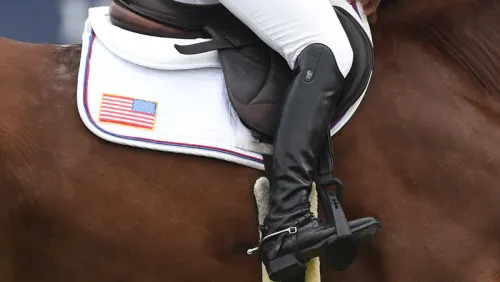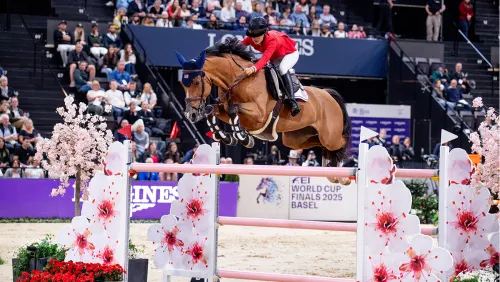Show jumper Alex Matz is no stranger to riding under pressure. At 24, his resume includes two trips to the FEI North American Youth Championships and multiple top-10 placings in U25 grand prix classes on several different horses.
But when Matz found himself riding first of 11 in the jump-off of the $100,000 Richard M. Feldman Grand Prix, held July 4 at the Lake Placid Horse Shows (New York), he knew he had to manage his adrenaline. This spring, he and his longtime mount Cashew CR have earned a series of good grand prix results at shows like the Kentucky Spring Classic and Upperville (Virginia). But they had yet to find themselves on top of the leaderboard, and Matz wanted to change that.
“He’s a fast horse naturally,” says Matz, who operates his Vintage Farm Sales out of Coatesville, Pennsylvania. “I’ve had a few instances where I’ve tried to win too badly, and it didn’t go well. So I tried to go as fast as I thought was reasonable, and luckily it held up.”

Alex Matz scored his first major grand prix win with Cashew CR at Lake Placid Horse Shows. Kind Media Photo
The pair’s 36.86-second trip around eight fences in the jump-off put Cashew CR (Cassini II—Udenna, Quinar), a 13-year-old Holsteiner gelding, a full 2 seconds ahead of second-placed Laura Chapot and Diadaro’s Flying Dutchman, earning Matz the first major grand prix win of his career.
If Matz’s last name sounds familiar, it should. His parents are Show Jumping Hall of Famer turned race horse trainer Michael Matz and Pan Am Games medalist D.D. Alexander Matz, both of whom were on hand to witness his victory. We caught up with Alex during Week 2 of the Lake Placid Horse Shows to learn more about his recent success, his training philosophies, and living up to the family name.
Tell us a little about Cashew CR.
He’s got a lot of nicknames—The Nuts, Cassius—but we usually call him Cashew. We’ve had him since he was 8. He’s great to deal with and pretty laid back most of the time, but he’s a professional. He’s very sweet. The girl that takes care of him, Shannon [Kingsley], has spoiled him rotten. He likes to cuddle with her. And he loves his treats. On the way to the ring, he’ll stop by anybody who will give him attention and ask for a treat. He’s like a big dog. He’s owned by my mother.
Who else is in your string right now?
ADVERTISEMENT
I have a few others at grand prix: Erdento Van De Leeuwerk (a 12-year-old Dutch Warmblood by Cardento owned by Horseshoe Trail Farm LLC) is new to the level but quite a nice horse. I have another horse named Flash (an 11-year-old Dutch Warmblood by Numero Uno owned by 5 Star Partners) who will do some grand prix soon. And I’ve gotten some grand prix experience with a horse named Davidson (a 13-year-old Dutch Warmblood by Harley VDL, also owned by 5 Star Partners). [Alex also has the ride on Horseshoe Trail Farm’s Jasmijn Van De Renthoeve, a 12-year-old Belgian Warmblood by Douglas, who competes in the 1.40-meter classes.]
What is a typical day like for you?
When I’m at a show, I like to get a lot of them out before they compete, so I might ride 10 or 12 times, but normally I ride seven to eight horses a day. I’m normally busy most of the day riding and training a bit. At home, I’ll ride a few horses at my place. And then I ride for the McNeil family—they have their own barn in Chester Springs [Pennsylvania]—so I’ll ride five or six there, then come home.
Coatesville, Pennsylvania, is such a horsey area. Has being there influenced you at all?
It’s great to be in an area where there are so many good horsemen and women. There are a lot of eventers—I went over and rode some horses for Boyd Martin last summer, so talking to him and learning how he runs his business was really interesting. There are lots of foxhunters, some dressage people, but not so many show jumpers. But it’s nice to speak with so many people who have been really successful, whether they are show jumpers or not. And we have [the University of Pennsylvania’s] New Bolton Center there, which is great.
What’s next on the schedule for you and your horses?
We’ll be here for another week, then we’ll be home a few weeks, then head to Michigan for two weeks in August. We’re going to do the Hamptons (New York) and maybe do Princeton (New Jersey) before the Hamptons. I don’t know yet after Southampton—it depends on how the horses are doing and what horses I have. I guess I haven’t planned further than that!
Will you have time to watch the Olympics?
ADVERTISEMENT
I hope I get to see it all! I wish everybody that made the team the best of luck—I hope to see every round. It depends on if I’m in the ring or not. If I’m not in the ring, I’ll be watching it.
As the son of two incredibly well-known and successful show jumpers, it must be hard to make a name for yourself independently of them. How have you navigated that path?
Well, I have the best advisors of all time! I basically do what they tell me and put my head down and work as hard as I can. I do everything the way my father did it and wants it done. They always told me if you work hard and are consistent, you can make your own way. That’s kind of my philosophy. If I can be as successful as they were—I’ll be OK.
Do you see yourself staying in the business for the long haul?
I think every kid in their 20s wonders about their future. I’m enjoying what I’m doing right now. I have a really nice horse and people who are willing to support me. Definitely for the foreseeable future I’m going to do what I can to be on Nations Cup teams and try to win as much as I can.
Your parents have obviously been hugely influential in developing your horsemanship skills. Do you have any other significant mentors?
It’s essentially just my parents. At home, my dad will come help me school the horses, and typically my mom travels to most of the shows. My dad comes to some too, but she’s always in the schooling area. They’re a huge part of my program and are always helping me. But it’s good to learn from everybody. I was talking to Joe Fargis, and he told me one thing with one of my other mares, and it helped me tremendously. There’s a lot to be learned, but essentially my parents are my biggest influence.
What are a few of the most important principles they’ve taught you?
Consistency is paramount. Making sure the horses are properly cared for and that they are in a consistent regimen. Every day you come out with the mindset of being a little better than the day before. I think as long as you can do that, the results will come. But you have to show up, even on the days that you don’t want to, and do the best that you can that day.
















